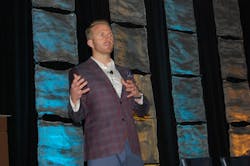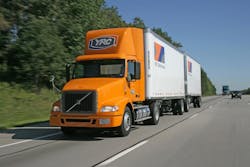PHILADELPHIA. Justin Hall believes that it’s time to rethink how trucking companies visualize themselves and the services they provide in order to survive and thrive in the increasingly digitized world of supply chain operations.
“We need to embrace and lead with technology,” Hall, chief customer officer for LTL conglomerate YRC Worldwide, explained during a presentation here at the ALK Technology Summit.
“Data is the new oil for our business,” he stressed. “Predictive analysis is a big deal for us; it will help us develop more dynamic pricing and better division of labor.”
As a result – and while stealing a line from financial services conglomerate J.P. Morgan in the process – Hall said YRC now describes itself this way: “We’re a technology company with an LTL network.”
Yet he also noted that re-visualizing YRC this way – a holding company for national LTL carrier YRC Freight, along with regional LTL operators Holland, Reddaway, and New Penn – doesn’t make the adoption of technology any easier.
“It is one thing to buy it [technology] and another thing to integrate it,” Hall explained. “It is much more difficult to embrace technology as a result of that.”
By way of background, he joined YRC almost one year ago to become the company’s first-ever “chief customer officer” as part of what James Welch, CEO of YRC Worldwide, described at the time as an effort to “create new market opportunities in an industry that is in the midst of significant transformation.”
Hall came to YRC after a 10-year stint as the founder and president of Logistics Planning Services (LPS) in St. Paul, MN; a third party logistics (3PL) firm named to the Inc. 500/5000 fastest growing companies a total of five times.
He’s also been something of a “serial entrepreneur” in the logistics sector, starting five successful companies ranging from an international NVOCC operation and a heavy-haul rail company to a commercial real estate firm and logistics software-as-service provider.
In Hall’s view, logistic services will “make or break” a shipper’s business model, and thus they require more accurate freight pricing and shipment information than ever before.
He also believes more shippers are looking for “one stop shops” for their freight and logistics services – one company that can provide everything they need – because “the good old days of having a robust traffic department are gone” and are not coming back.
Shippers today, Hall said, “are telling me they have too much on their plate; that they are wearing too many hats” when it comes to managing logistics. That’s why a one-stop shop “is very appealing,” he noted; one that can handle final mile, reverse logistics, contract logistics, etc., with technology providing for their real-time data needs.Yet that’s not necessarily easy to do with a company of the size and scope of YRC, Hall added: a company with 384 terminals that operates 60,000 pieces of equipment and employs 32,000.
“Making high velocity data-based decisions are easy in a small business; they can see a trend and react quickly,” he stressed. “That’s harder to do in a large business.”
Thus, to make itself more nimble – especially when it comes to deploying technology – Hall said YRC is developing “pods” within its organization; small cross-functional teams that can make faster real-time decisions for customers, especially in terms of pricing.
“We’re trying to get the groups within our company to act like entrepreneurs,” he emphasized. “That’s because it can no longer just about picking up and dropping off freight. Lengths of hauls are dropping; goods are being positioned closer to customers; a larger and larger number of parcel and e-commerce shipments are over 100 lbs. and going to residences – that [segment] is growing 10% to 12% a year. This is all completely changing how we need to do things.”
About the Author
Sean Kilcarr
Editor in Chief
Sean Kilcarr is a former longtime FleetOwner senior editor who wrote for the publication from 2000 to 2018. He served as editor-in-chief from 2017 to 2018.


